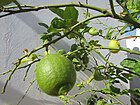Note: This is a project under development. The articles on this wiki are just being initiated and broadly incomplete. You can Help creating new pages.
Difference between revisions of "Citrus limon - Bijapuraka, Jambira"
(→Identification) |
(→References) |
||
| (5 intermediate revisions by the same user not shown) | |||
| Line 9: | Line 9: | ||
==Chemical Composition== | ==Chemical Composition== | ||
| − | All parts of the plants of citrus sp. contain coumarins and psoralins. The fruits contain flavonoids and limonoids | + | All parts of the plants of citrus sp. contain coumarins and psoralins. The fruits contain flavonoids and limonoids.<ref name="chemical composition"/> |
==Common names== | ==Common names== | ||
| Line 41: | Line 41: | ||
===Fruit=== | ===Fruit=== | ||
| − | {{Fruit|Ellipsoid to ovoid|7–10 mm|Fruits are yellow, ellipsoid to ovoid, narrowed at both ends, surface usually coarse and lemon scented| | + | {{Fruit|Ellipsoid to ovoid|7–10 mm|Fruits are yellow, ellipsoid to ovoid, narrowed at both ends, surface usually coarse and lemon scented|Apex acute|Seeds ovoid}} |
===Other features=== | ===Other features=== | ||
| Line 78: | Line 78: | ||
<references> | <references> | ||
| − | <ref name="chemical composition">[http://gbpihedenvis.nic.in/PDFs/Glossary_Medicinal_Plants_Springer.pdf | + | <ref name="chemical composition">[http://gbpihedenvis.nic.in/PDFs/Glossary_Medicinal_Plants_Springer.pdf Chemistry]</ref> |
| − | <ref name="Ayurvedic preparations">[https://liveayurvedalife.com/nimbuka-citrus-acida-roxb-ayurvedic-herb/ | + | <ref name="Ayurvedic preparations">[https://liveayurvedalife.com/nimbuka-citrus-acida-roxb-ayurvedic-herb/ Ayurvedic preparations]</ref> |
| − | <ref name="Leaf">[http://eol.org/pages/582200/details | + | <ref name="Leaf">[http://eol.org/pages/582200/details Morphology]</ref> |
| − | <ref name="How to plant/cultivate">[https://www.almanac.com/plant/lemons-oranges | + | <ref name="How to plant/cultivate">[https://www.almanac.com/plant/lemons-oranges Planting of lemon]</ref> |
</references> | </references> | ||
==External Links== | ==External Links== | ||
| − | * [https://plantvillage.psu.edu/topics/lemon/infos | + | * [https://plantvillage.psu.edu/topics/lemon/infos Lemon on plant vilage.education] |
| − | * [https://www.botanical-online.com/medicinalslimonangles.htm | + | * [https://www.botanical-online.com/medicinalslimonangles.htm Lemon tree on botonical online.com] |
| − | * [https://www.britannica.com/plant/lemon | + | * [https://www.britannica.com/plant/lemon Lemon on encyclopedea britanicca] |
* [http://www.missouribotanicalgarden.org/PlantFinder/PlantFinderDetails.aspx?kempercode=b548 Jambira on missouri botonical garden] | * [http://www.missouribotanicalgarden.org/PlantFinder/PlantFinderDetails.aspx?kempercode=b548 Jambira on missouri botonical garden] | ||
[[Category:Herbs]] | [[Category:Herbs]] | ||
[[Category:Ayurvedic herbs that don't have seed photos]] | [[Category:Ayurvedic herbs that don't have seed photos]] | ||
[[Category:Rutaceae]] | [[Category:Rutaceae]] | ||
Latest revision as of 16:27, 16 April 2020
Citrus limon is a species of small evergreen tree in the flowering plant family Rutaceae and it is native to Asia.
Contents
- 1 Uses
- 2 Parts Used
- 3 Chemical Composition
- 4 Common names
- 5 Properties
- 6 Habit
- 7 Identification
- 8 List of Ayurvedic medicine in which the herb is used
- 9 Where to get the saplings
- 10 Mode of Propagation
- 11 How to plant/cultivate
- 12 Commonly seen growing in areas
- 13 Photo Gallery
- 14 References
- 15 External Links
Uses
Common cold, Cough, Cancer, Kidney stone, Systolic blood pressure, Acid reflux, Gastritis, Arthritis, Gouty diathesis.
Parts Used
Chemical Composition
All parts of the plants of citrus sp. contain coumarins and psoralins. The fruits contain flavonoids and limonoids.[1]
Common names
| Language | Common name |
|---|---|
| Kannada | Nimbe hannu |
| Hindi | Nimbu,Nilbu |
| Malayalam | NA |
| Tamil | Elumichai |
| Telugu | Nimma pandu |
| Marathi | NA |
| Gujarathi | NA |
| Punjabi | NA |
| Kashmiri | NA |
| Sanskrit | NA |
| English | ALime or Sour lime |
Properties
Reference: Dravya - Substance, Rasa - Taste, Guna - Qualities, Veerya - Potency, Vipaka - Post-digesion effect, Karma - Pharmacological activity, Prabhava - Therepeutics.
Dravya
Rasa
Amla (sour)
Guna
Laghu (Light), Tikshna (Sharp)
Veerya
Ushna (Hot)
Vipaka
Amla (sour)
Karma
Kapha, Vata
Prabhava
Habit
Identification
Leaf
| Kind | Shape | Feature |
|---|---|---|
| Simple | Ovate | Margin of leaves are conspicuously crenulate |
Flower
| Type | Size | Color and composition | Stamen | More information |
|---|---|---|---|---|
| Bisexual | 2-4cm long | Pale yellow | 5 | Flowers solitary or several in fascicles |
Fruit
| Type | Size | Mass | Appearance | Seeds | More information |
|---|---|---|---|---|---|
| Ellipsoid to ovoid | 7–10 mm | Fruits are yellow, ellipsoid to ovoid, narrowed at both ends, surface usually coarse and lemon scented | Apex acute | Seeds ovoid | {{{6}}} |
Other features
List of Ayurvedic medicine in which the herb is used
Where to get the saplings
Mode of Propagation
How to plant/cultivate
Citrus trees should be planted in a sunny and wind-protected area[4]
Commonly seen growing in areas
Tropical area, Subtropical area, Temperate area.
Photo Gallery
References
External Links
- Ayurvedic Herbs known to be helpful to treat Common cold
- Ayurvedic Herbs known to be helpful to treat Cough
- Ayurvedic Herbs known to be helpful to treat Cancer
- Ayurvedic Herbs known to be helpful to treat Kidney stone
- Ayurvedic Herbs known to be helpful to treat Systolic blood pressure
- Ayurvedic Herbs known to be helpful to treat Acid reflux
- Ayurvedic Herbs known to be helpful to treat Gastritis
- Ayurvedic Herbs known to be helpful to treat Arthritis
- Ayurvedic Herbs known to be helpful to treat Gouty diathesis
- Herbs with Leaves used in medicine
- Herbs with Fruits used in medicine
- Herbs with common name in Kannada
- Herbs with common name in Hindi
- Herbs with common name in Tamil
- Herbs with common name in Telugu
- Herbs with common name in English
- Habit - Herb
- Index of Plants which can be propagated by Seeds
- Index of Plants which can be propagated by Cuttings
- Herbs that are commonly seen in the region of Tropical area
- Herbs that are commonly seen in the region of Subtropical area
- Herbs that are commonly seen in the region of Temperate area
- Herbs
- Ayurvedic herbs that don't have seed photos
- Rutaceae






